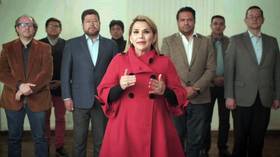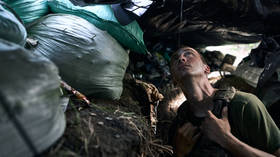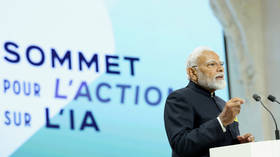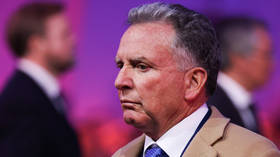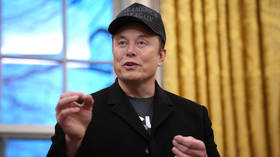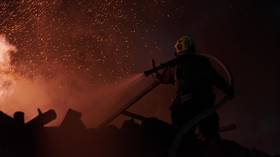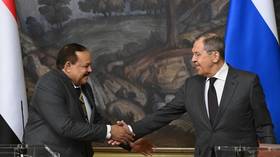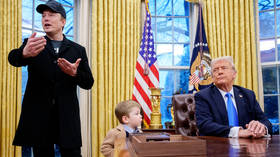Bolivia has every right to prosecute coup perpetrators for their crimes
The arrest of Bolivia’s former interim president Jeanine Áñez and her coup co-conspirators is being painted by pro-Western organizations as political persecution, but it’s far from that.
Bolivian authorities arrested ex-interim president Jeanine Áñez on March 14 for sedition, terrorism and conspiracy for her role in the 2019 coup that ousted former president Evo Morales and ushered in a dark age of violence and repression in the country. Justice Minister Ivan Lima said days after the arrest that he would seek a 30-year sentence for Áñez if found guilty, a sign that the victims of the coup regime’s repression will get the justice they deserve.
There have been many more arrests, including several ministers under the Áñez government and right-wing paramilitary leaders involved, and more are expected to follow. In many of these cases, it’s social movements leading the pressure for charges to be brought against co-conspirators in the coup.
This shows that President Luis Arce, a member of Morales’ Movement toward Socialism (MAS), is serious about getting the country back on its pre-coup developmental path – and keeping criminals accountable.
To be sure, the coup government of Jeanine Áñez tried hard to take Bolivia off of this path and that’s why they worked to radically change the character of institutions in the country. They repressed the MAS and grassroots social movements; allowed street gangs to terrorize and murder dissenters; worked to destroy the free press and opened the country back up to Western capital penetration, which they called a “return to civilization.” (A racist dig at Evo Morales, the country’s first indigenous leader).
Now, for Arce and his government, course-correcting will take a correspondingly heavy approach. That being said, it does not mean that one should fall into the intellectual trap of both-sidesism, i.e. that both sides are just as bad as one another. Such a position fails to appreciate exactly how repressive Áñez and her co-conspirators were, and, by comparison, how orderly the judicial process they face is.
Just look at the 2019 Senkata and Sacaba Massacres that occurred immediately after Áñez took power. With Decree 4078, a license to kill that was so blatant it was even denounced by Amnesty International, Áñez absolved armed forces of any criminal liability in their actions and they immediately massacred anti-coup protesters. That same month, family members carried the coffins of those killed in the attack through the city of La Paz and Áñez ordered a crackdown on the march.
This isn’t even to speak of the violence that took place during the events of the coup. Áñez was actually able to seize power in the first place after the resignation of Victor Borda, former president of the lower house representing MAS, after protesters tortured his brother and burned his family home down.
Despite these extraordinarily well-documented crimes, many in the Western media and Western-backed institutions are painting the arrests of the former coup government officials and their street militias as political persecution against the MAS’ opposition.
Also on rt.com Bolivia’s former interim president Jeanine Anez arrested over 2019 coupThese are the same kinds of people that have criticized independent governments for decades, who have apparently no limit to the amount of empathy they can express for murderers and traitors, and whose barometer for democracy is whether pro-Western radicals are allowed to carry on with impunity.
Just look at the Organization of American States (OAS), an organization that was one of the main drivers of the 2019 coup when it falsely claimed there were election irregularities during that year’s presidential election. The OAS recently called on Bolivia to release Áñez and the other coup co-conspirators because of supposed problems in the country’s judicial system, saying they should be tried before the International Criminal Court (ICC) instead to provide a “fair” trial.
Likewise, this sentiment was followed by Human Rights Watch. For its part, this human rights NGO denounced Bolivia last week for giving amnesty to those arrested by the coup government. According to them, the amnesty decree issued by President Arce was too broad and could allow for serious crimes to be dismissed.
Western media outlets are predictably condemning the arrests, labeling them as persecution. The AP ran with the headline, “Bolivia's ex-interim president arrested in opposition crackdown,” which was reprinted as-is in many major English language media publications.
For her part, Áñez is also actively fielding support from foreign governments. A letter sent by Áñez to OAS chief Luis Almagro dated March 13, a day before her arrest, described the charges as political persecution. The memo apparently got through to at least an imaginary government since Venezuela’s “Legitimate Government,” the one headed by Venezuelan non-president Juan Guaidó issued a statement of support for Áñez.
Pro-Western organizations and media have little concern for “democracy” or “human rights” and only truly care about supporting governments that kowtow to the interests of multinational corporations. Holding their favored leaders accountable for crimes is “political persecution” and apparently in the same category as street violence, torture and mass murder. The hypocrisy never ends.
When President Arce took power office in November, he promised to “rebuild the country in unity.” What he did not say was that Bolivia would allow murderers to roam freely, because surely that would only set the country up to be further divided by external forces. That is exactly what happened the whole year before he took office.
Bolivia is showing the world what justice and the rule of law look like, whether Western countries like it or not.
Think your friends would be interested? Share this story!
The statements, views and opinions expressed in this column are solely those of the author and do not necessarily represent those of RT.

